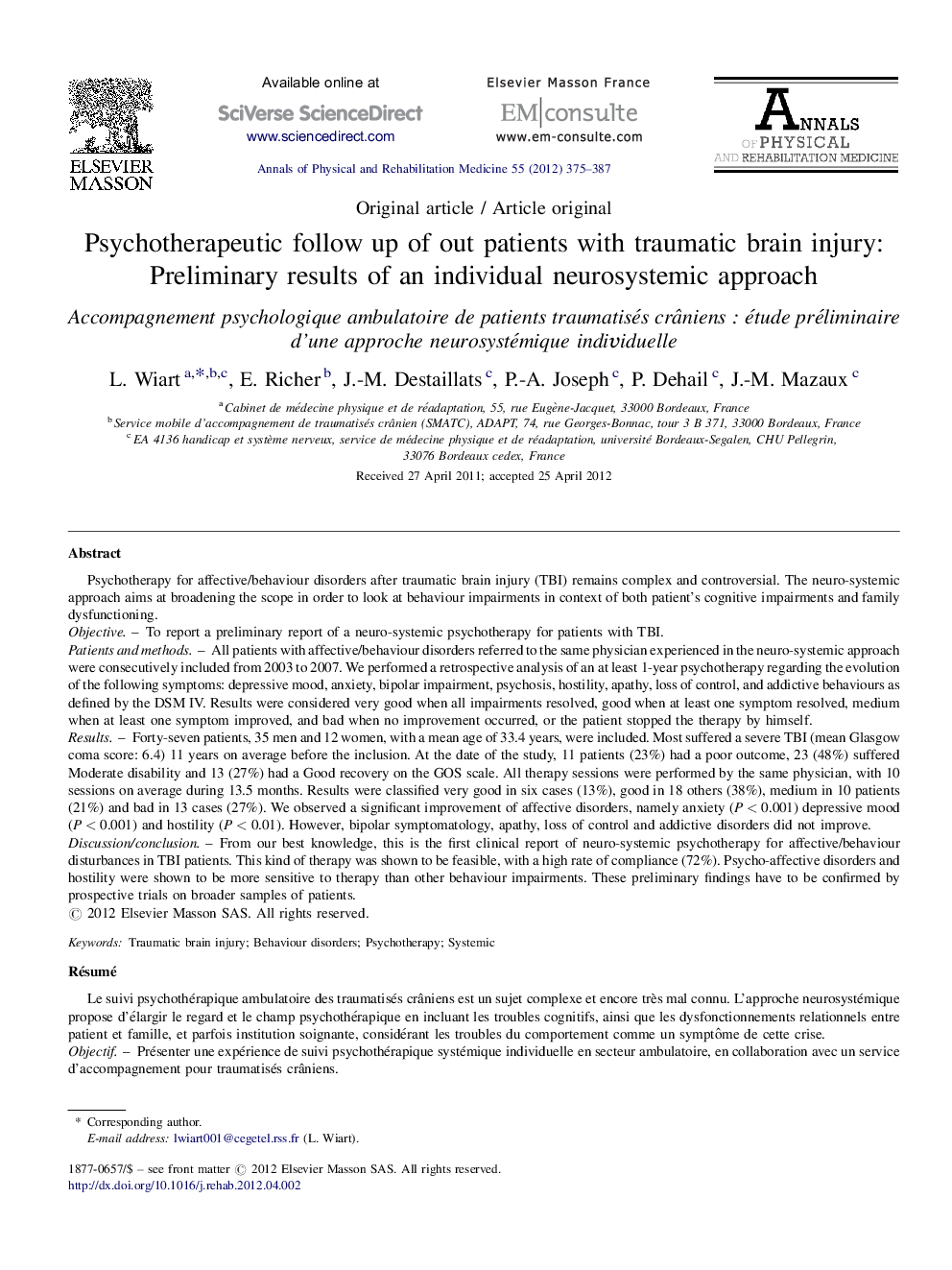| کد مقاله | کد نشریه | سال انتشار | مقاله انگلیسی | نسخه تمام متن |
|---|---|---|---|---|
| 4041041 | 1603325 | 2012 | 13 صفحه PDF | دانلود رایگان |

Psychotherapy for affective/behaviour disorders after traumatic brain injury (TBI) remains complex and controversial. The neuro-systemic approach aims at broadening the scope in order to look at behaviour impairments in context of both patient's cognitive impairments and family dysfunctioning.ObjectiveTo report a preliminary report of a neuro-systemic psychotherapy for patients with TBI.Patients and methodsAll patients with affective/behaviour disorders referred to the same physician experienced in the neuro-systemic approach were consecutively included from 2003 to 2007. We performed a retrospective analysis of an at least 1-year psychotherapy regarding the evolution of the following symptoms: depressive mood, anxiety, bipolar impairment, psychosis, hostility, apathy, loss of control, and addictive behaviours as defined by the DSM IV. Results were considered very good when all impairments resolved, good when at least one symptom resolved, medium when at least one symptom improved, and bad when no improvement occurred, or the patient stopped the therapy by himself.ResultsForty-seven patients, 35 men and 12 women, with a mean age of 33.4 years, were included. Most suffered a severe TBI (mean Glasgow coma score: 6.4) 11 years on average before the inclusion. At the date of the study, 11 patients (23%) had a poor outcome, 23 (48%) suffered Moderate disability and 13 (27%) had a Good recovery on the GOS scale. All therapy sessions were performed by the same physician, with 10 sessions on average during 13.5 months. Results were classified very good in six cases (13%), good in 18 others (38%), medium in 10 patients (21%) and bad in 13 cases (27%). We observed a significant improvement of affective disorders, namely anxiety (P < 0.001) depressive mood (P < 0.001) and hostility (P < 0.01). However, bipolar symptomatology, apathy, loss of control and addictive disorders did not improve.Discussion/conclusionFrom our best knowledge, this is the first clinical report of neuro-systemic psychotherapy for affective/behaviour disturbances in TBI patients. This kind of therapy was shown to be feasible, with a high rate of compliance (72%). Psycho-affective disorders and hostility were shown to be more sensitive to therapy than other behaviour impairments. These preliminary findings have to be confirmed by prospective trials on broader samples of patients.
RésuméLe suivi psychothérapique ambulatoire des traumatisés crâniens est un sujet complexe et encore très mal connu. L’approche neurosystémique propose d’élargir le regard et le champ psychothérapique en incluant les troubles cognitifs, ainsi que les dysfonctionnements relationnels entre patient et famille, et parfois institution soignante, considérant les troubles du comportement comme un symptôme de cette crise.ObjectifPrésenter une expérience de suivi psychothérapique systémique individuelle en secteur ambulatoire, en collaboration avec un service d’accompagnement pour traumatisés crâniens.Patients et méthodesTous les patients traumatisés crâniens adressés de 2004 à 2008 par un réseau médico-social pour un suivi psychothérapique à un médecin libéral spécialiste de médecine physique et réadaptation formé à l’approche neurosystémique ont été inclus. L’analyse a porté sur la présence un an au minimum après le début de la prise en charge de troubles affectifs : dépression, anxiété, bipolarité, psychose ou de troubles comportementaux : agressivité, apathie, désinhibition, addiction, selon les critères du DSM4. Les résultats ont été classés en quatre groupes : groupe 1 : disparition des troubles ; groupe 2 : disparition d’au moins un trouble ; groupe 3 : amélioration d’au moins un trouble ; groupe 4 : pas d’amélioration ou perdu de vue. L’analyse statistique des résultats a été effectuée en mode univarié par tests non paramétriques.RésultatsOn note que 47 patients ont été inclus : 35 hommes et 12 femmes, âgés de 33,4 ans en moyenne. Le traumatisme datait de 11 ans en moyenne. Il s’agissait pour la plupart de traumatismes crâniens graves, avec un score de Glasgow initial moyen de 6,5. Au moment de l’étude, 11 patients (23 %) présentaient un handicap sévère (GOS 3), 23 (48 %) un handicap modéré (GOS 2) et 13 (27 %) avaient une bonne récupération (GOS 1). Les entretiens neurosystémiques ont tous été effectués par le même praticien. La durée de suivi a été de 13,5 mois, avec dix entretiens un recul moyen de 26,4 mois.Résultats quantitatifsOn relevait en fin d’étude six patients dans le groupe 1 (13 %), 18 dans le groupe 2 (38 %), dix dans le groupe 3 (21 %) et 13 dans le groupe 4 (27 %).Résultats qualitatifsIl existait une amélioration significative globale des troubles affectifs (p < 0,001), en particulier, de l’anxiété (p < 0,001) de la dépression (p < 0,001) et de l’agressivité (p < 0,01), mais pas d’amélioration significative des troubles du comportement, de la bipolarité, de la psychose, de l’apathie, de la désinhibition ou de l’addiction.Discussion/conclusionIl s’agit de la première étude consacrée à la prise en charge psychothérapique systémique individuelle des traumatisés crâniens en secteur de ville. La faisabilité est satisfaisante, 72 % des patients ayant acceptés le suivi. Les résultats semblent meilleurs sur les troubles affectifs que sur les troubles comportementaux en dehors de l’agressivité. Ces données préliminaires restent à confirmer par un travail prospectif sur une plus grande échelle.
Journal: Annals of Physical and Rehabilitation Medicine - Volume 55, Issue 6, September 2012, Pages 375–387